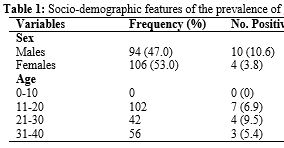Prevalence of Schistosomiasis and Associated Risks Factors among Patients with Urinary Tract Infection Attending Specialist Hospital Bauchi
DOI:
https://doi.org/10.54117/ijamb.v3i1.21Keywords:
Schistosoma hamatobium, UTIs, Risk factors, SchistosomiasisAbstract
Background: Schistosomiasis, a parasitic disease caused by Schistosoma species, remains a significant public health concern in many developing regions, including Bauchi, Nigeria. This study aims to assess the prevalence of schistosomiasis and identify associated risk factors among patients with urinary tract infections (UTIs) attending the Specialist Hospital Bauchi.
Methods: A cross-sectional study was conducted involving patients presenting with UTI symptoms at the Specialist Hospital Bauchi. Urine samples were collected and analyzed for Schistosoma haematobium eggs using microscopy. Demographic and clinical data were obtained through structured questionnaires to identify potential risk factors for schistosomiasis, including water contact activities, sanitation practices, and socio-economic status.
Results: Out of the total patients screened, a significant proportion tested positive for Schistosoma haematobium, indicating a notable prevalence of schistosomiasis among UTI patients. Statistical analysis revealed several risk factors strongly associated with schistosomiasis, including frequent contact with contaminated water sources, poor sanitation facilities, and lower socio-economic status.
Conclusion: The study highlights a high prevalence of schistosomiasis among UTI patients in Bauchi, underscoring the need for integrated disease management and prevention strategies. Public health interventions focusing on improving water sanitation, health education, and targeted treatment programs are essential to reduce the burden of schistosomiasis in this region. These findings can stimulate further research and policy development aimed at controlling this neglected tropical disease.

Downloads
Published
How to Cite
Issue
Section
License
Copyright (c) 2024 Kabir Hassan Sambo, Ibrahim Musa Moi, Abdullahi Mohammed, Hauwa Yakubu, Bashir Mohammed, Shamsu Ishaq Abdullahi

This work is licensed under a Creative Commons Attribution 4.0 International License.
